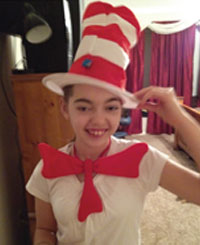
Shelby
Life is full of surprises and having a child born with a disorder we knew nothing about was a big one. It’s funny how you can become an expert on something when you need to be. And we needed to be. Our daughter Shelby began having generalized tonic clonic seizures before she was 5 months old. We were petrified. It’s a helpless feeling to watch your child suffer. The helplessness multiplied as we tried endless pharmaceutical combinations and treatments (including the ketogenic diet and the Vagus Nerve Stimulator), hoping that the next one would bring control. And now, almost 15 years later, control still eludes us. When Shelby was 8 years old, we finally had a diagnosis for what we had simply been calling a seizure disorder – Dravet Syndrome.
Shelby has severe developmental delays. At 14, she operates like a child not quite 2. She speaks in one-word utterances, can’t run, needs help feeding herself and is still in diapers. She has low muscle tone and has to use a wheelchair at times. Some of these delays are due to the gene mutation she carries. Some, we have no doubt, are the result of the huge doses of expensive anticonvulsant medication she has been taking for all of her young life. Her medications also cause constant sleep disturbances. In the last calendar year, we can count on one hand the nights of uninterrupted sleep we have all had.
Despite the challenges, Shelby is a wonderful gift from God. I have watched her bring out the best in those around her. Her special gift is love. She brightens the day of many strangers as she asks for hugs wherever we go. But we have exhausted all current options for increasing seizure control and increasing physical and intellectual development. So we fight to turn over rocks left untouched and pray for something different to treat her. We don’t believe God is through with Shelby yet. There are many lives left for her to touch.
